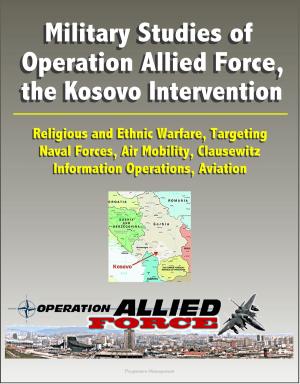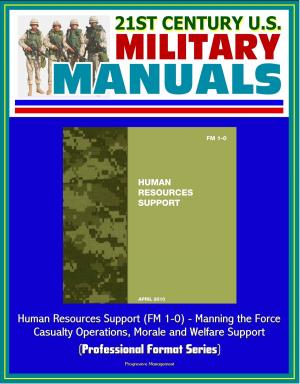2011 Al Qaeda and Affiliates: Historical Perspective, Global Presence, and Implications for U.S. Policy - Congressional Research Service Report
Nonfiction, Social & Cultural Studies, Political Science, International| Author: | Progressive Management | ISBN: | 9781458079077 |
| Publisher: | Progressive Management | Publication: | May 21, 2011 |
| Imprint: | Smashwords Edition | Language: | English |
| Author: | Progressive Management |
| ISBN: | 9781458079077 |
| Publisher: | Progressive Management |
| Publication: | May 21, 2011 |
| Imprint: | Smashwords Edition |
| Language: | English |
This important CRS report on Al Qaeda and its affiliates deals with historical perspectives, global presence, and implications for U.S. policy. There is extensive coverage of al Qaeda in the Arabian peninsula (AQAP), North Africa/Sahel: Al Qaeda in the Islamic Maghreb (AQIM), East Africa, Somalia, Al Qaeda and Radical Islamist Extremists in Southeast Asia, Al Qaeda’s Global Strategy and Implications for U.S. Policy, and more.
Al Qaeda (AQ) has evolved into a significantly different terrorist organization than the one that perpetrated the September 11, 2001, attacks. At the time, Al Qaeda was composed mostly of a core cadre of veterans of the Afghan insurgency against the Soviet Union, with a centralized leadership structure made up mostly of Egyptians. Most of the organization’s plots either emanated from the top or were approved by the leadership. Some analysts describe pre-9/11 Al Qaeda as akin to a corporation, with Osama Bin Laden acting as an agile Chief Executive Officer issuing orders and soliciting ideas from subordinates.
Understanding the origins of Al Qaeda, its goals, current activities, and prospective future pursuits is key to developing sound U.S. strategies, policies, and programs. Appreciating the adaptive nature of Al Qaeda as a movement and the ongoing threat it projects onto U.S. global security interests assists in many facets of the national security enterprise, including securing the homeland; congressional legislative process and oversight; alignment of executive branch resources and coordination efforts; and prioritization of foreign assistance.
The focus of this report is on the history of Al Qaeda, known (or attributed) actions and suspected capabilities of the organization and non-aligned entities, and an analysis of select regional Al Qaeda affiliates.
The Congressional Research Service (CRS) works exclusively for the United States Congress, providing policy and legal analysis to committees and Members of both the House and Senate, regardless of party affiliation. As a legislative branch agency within the Library of Congress, CRS has been a valued and respected resource on Capitol Hill for nearly a century. CRS is well-known for analysis that is authoritative, confidential, objective and nonpartisan. Its highest priority is to ensure that Congress has 24/7 access to the nation’s best thinking.
This important CRS report on Al Qaeda and its affiliates deals with historical perspectives, global presence, and implications for U.S. policy. There is extensive coverage of al Qaeda in the Arabian peninsula (AQAP), North Africa/Sahel: Al Qaeda in the Islamic Maghreb (AQIM), East Africa, Somalia, Al Qaeda and Radical Islamist Extremists in Southeast Asia, Al Qaeda’s Global Strategy and Implications for U.S. Policy, and more.
Al Qaeda (AQ) has evolved into a significantly different terrorist organization than the one that perpetrated the September 11, 2001, attacks. At the time, Al Qaeda was composed mostly of a core cadre of veterans of the Afghan insurgency against the Soviet Union, with a centralized leadership structure made up mostly of Egyptians. Most of the organization’s plots either emanated from the top or were approved by the leadership. Some analysts describe pre-9/11 Al Qaeda as akin to a corporation, with Osama Bin Laden acting as an agile Chief Executive Officer issuing orders and soliciting ideas from subordinates.
Understanding the origins of Al Qaeda, its goals, current activities, and prospective future pursuits is key to developing sound U.S. strategies, policies, and programs. Appreciating the adaptive nature of Al Qaeda as a movement and the ongoing threat it projects onto U.S. global security interests assists in many facets of the national security enterprise, including securing the homeland; congressional legislative process and oversight; alignment of executive branch resources and coordination efforts; and prioritization of foreign assistance.
The focus of this report is on the history of Al Qaeda, known (or attributed) actions and suspected capabilities of the organization and non-aligned entities, and an analysis of select regional Al Qaeda affiliates.
The Congressional Research Service (CRS) works exclusively for the United States Congress, providing policy and legal analysis to committees and Members of both the House and Senate, regardless of party affiliation. As a legislative branch agency within the Library of Congress, CRS has been a valued and respected resource on Capitol Hill for nearly a century. CRS is well-known for analysis that is authoritative, confidential, objective and nonpartisan. Its highest priority is to ensure that Congress has 24/7 access to the nation’s best thinking.















